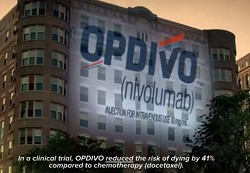DTC isn't just for everyday treatments anymore.
Just ask Bristol-Myers Squibb ($BMY), which last year rolled out its first television commercial for a cancer drug, or Vanda Pharmaceuticals ($VNDA), which runs ads for a drug to treat a sleep disorder that affects just 80,000 patients in the U.S.
Drugmakers are taking up the tactic to promote specialty therapies for tiny populations and meds for life-threatening diseases--and that means some of the industry's most pricey remedies are seeing the airwaves.
What's the reasoning behind shelling out major money to reach a relative handful of people? With sky-high price tags on lifesaving therapies, it pays, Northwestern University marketing professor Timothy Calkins told The Wall Street Journal.
 |
| Bristol-Myers Squibb's Opdivo ad |
At a time when high drug prices are triggering backlash from politicians, doctors and patients alike, the fact that DTC ads don't allude to price can work in companies' favor. Bristol's ad for Opdivo, for example, was meant to encourage patients "to have an informed discussion with their physician about available treatment options," a company spokeswoman told FiercePharma by email last month--and it leaves out the med's $12,500 average monthly price.
"We understand that these individuals are eager to learn more about new, available options, and we believe our DTC campaign may be an effective way to provide meaningful education and support to the advanced stage lung cancer community," she said.
Commercials like BMS' don't trigger the sticker shock that may prevent a patient from inquiring about a therapy, Robert Ehrlich, CEO of strategy adviser DTC Perspectives, told the WSJ. And when they do, it "puts pressure on insurers to cover" the meds consumers are asking about, he said.
Or take Vanda's Hetlioz, which treats a sleep disorder in blind people. The med--which fewer than 1,000 people currently take--rings up at $148,000 per year. And more than 12,000 people have called a toll free number mentioned in Vanda's ads in search of more information, CEO Mihael Polymeropoulos told the newspaper.
"We would have rather avoided the expense of a campaign, but there was no other efficient way of doing it," he said.
DTC advertising has its critics, though--especially now that more drugmakers are getting in on the strategy. Last November, the American Medical Association voted to ban all DTC advertising for drugs and medical devices, citing the "negative impact of commercially-driven promotions and the role that marketing costs play in fueling escalating drug prices."
- read the WSJ story (sub. req.)
Special Report: The top 10 advertisers in Big Pharma | The top 10 most-advertised prescription drug brands